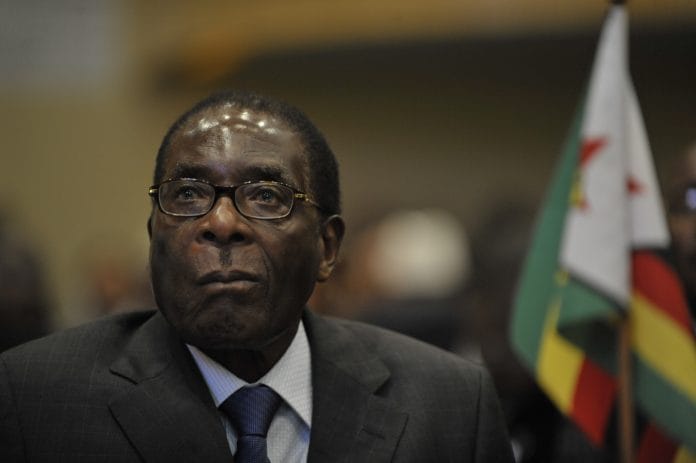The sudden end of Robert Mugabe’s 37-year old reign is steeped in drama and uncertainty. Drama, because- as sexist myths have had you believe- his wife, Grace, has much to do with the abrupt end to the tyrant’s hegemony. Uncertainty, because for all the hope that the coup has stirred among Zimbabweans, the army is no paragon of democratic values.
An ungraceful ouster
It would be awfully sexist and stereotypical to say that the blow to Robert Mugabe’s 37-year old reign in Zimbabwe has something to do with the ailing tyrant’s wife. But it probably does, argues The Economist.
“The putative elevation to the presidency of Mrs Mugabe, the president’s former typist and an extravagant avid shopper, disgusted even the most cynical elders of ZANU-PF, the ruling party. Many ZANU bigwigs fought in a bush war against white-minority rule in what was then Rhodesia and saw the 52-year-old Mrs Mugabe as a power-hungry interloper. They are equally contemptuous of her ‘G40’ (‘Generation 40’) faction, a relatively younger coterie of ZANU-PF ministers.”
“For a while, Mrs Mugabe seemed to be in the ascendant. But she failed to take account of how despised she is within the party, particularly since she picked fights with two of its most important factions—the securocrats and former bush fighters—in her bid to eliminate rivals to the presidency.”
“Mrs Mugabe made yet more enemies when she took a leading role in trying to force out Mr Mnangagwa, a former longtime head of the security services. ‘The snake must be hit on the head,’ Mrs Mugabe had declared at a public meeting just days before his defenestration.”
“On Monday the chief of the defence forces, General Constantino Chiwenga, gave a press conference in which he issued a thinly-veiled threat to Mrs Mugabe and her faction. He warned ZANU-PF against purging members “with a liberation background” and said the army would not hesitate to step in. Barely two days later it did…”
The damned ruler
While most of the world and his critics saw Robert Mugabe as a unidimensional study, Simon Tisdall writes in The Guardian that “the truth is not quite so black and white”.
“Robert Mugabe, who first came to power in Zimbabwe in 1980, is a man of many faces: idealistic young Marxist-Leninist, political prisoner, freedom fighter, lauded icon of pan-African nationalism, would-be reformer, and ruthless, ageing dictator steeped in corruption and sleaze.”
“In retrospect, his career slowly slid by stages from triumph to tragedy. In 1980, leading the charge for independence, he was the right man in the right place. But like other freedom fighters and African nationalists of his generation, Nelson Mandela excepted, he never mastered the art of pluralist, democratic governance.”
“Mugabe’s reign became a byword for misrule. Power corrupted him. And yet, as his many abject failures demonstrate, he was never quite as powerful as he and others believed.”
A fragile opportunity
While many Zimbabweans would hope that Mugabe’s ouster would herald the beginning of democracy in the corruption and poverty-steeped country, chances of that appear to be grim, editorialises The Washington Post.
“Many Zimbabweans and some in Western governments may welcome any change in the country after 37 years of Mr. Mugabe. Some reports suggest that Mr. Mnangagwa, if put in power, could reverse some of the regime’s worst mistakes. A Reuters article in September, sourced to reports by the state intelligence agency, said he was contemplating forming a unity government with opposition leader Morgan Tsvangirai and reaching out to dispossessed white farmers in a bid to revive the agricultural economy.”
“Mr. Mnangagwa is not, however, committed to competing in an election, according to the Reuters report. Given his notoriety and the dire state of the economy, he could easily lose a fair vote to Mr. Tsvangirai. Yet without an election that provides a genuine popular mandate, the chance for reforms that could revive the economy looks small.
That’s why the United States and other Western governments should insist on a prompt restoration of constitutional order and a firm commitment by the military to holding internationally supervised elections next year. The outside world has leverage, including potential help with Zimbabwe’s defaulted international debts. The end of Mr. Mugabe’s rule offers a fragile opportunity to rescue an African country — but only if it does not lead to the installation of another strongman.”
A bleak future
Democracy or even semblances of it cannot be achieved through a coup, argues Glen Mpani in the New York Times. The coup in Zimbabwe then calls for a serious contemplation over what lies ahead, and not celebration.
“Some citizens, rightfully desperate for change, say this is the best step toward some kind of reform, but it’s not. There is evidence this intervention is driven by the self-interest of military generals rather than national interest, which makes prospects for economic and democratic reforms bleak.”
“It’s no secret that Mr. Mugabe and his party, ZANU-PF, are unpopular. But the army will, without a doubt, continue the party’s rule. In successive elections since 2000, the army played a very retrogressive role in rigging elections and leading violence in the name of ‘national interest’.”
“Handing power to the military will leave Zimbabweans at the mercy of a very unpredictable group that has rarely worked on behalf of the people. And military leadership will most certainly leave the people with an unpredictable future. While the military might want to use this opportunity to reorganize the ZANU-PF and then call for an election, the party’s problems are not the people’s problems.”
“As Zimbabweans around the world celebrate a moment of relief, we must remember that the future looks bleak. Coups are a regressive path to achieving democratic ends.”






